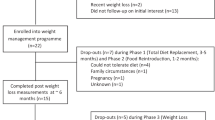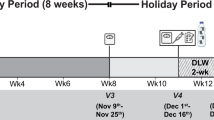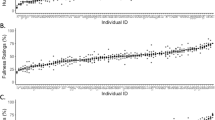Abstract
Background:
The current epidemic of obesity demonstrates that mechanisms for maintaining human energy balance are readily subverted by adverse environmental conditions. The critical elements of this dysregulation are poorly understood. Most previous research into what regulates the intake side of the energy balance equation has been handicapped by the use of short-term within-day experimental tests.
Objective:
We enrolled six non-obese men to a 17-week protocol involving three 21 days periods of progressive overfeeding (+20, +40 and +60%) separated by free diet periods to test for compensatory satiety.
Results:
Responses to overfeeding differed markedly with evidence of ‘compensators’ and ‘non-compensators’, but on average, subsequent food intake was stimulated rather than suppressed after overfeeding in spite of markedly elevated body fat (+13%) and fasting leptin (+116%).
Discussion:
The inefficient response of in-built appetite control mechanisms emphasizes the need to adopt intentional cognitive restraint in the modern environment when food is plentiful.
This is a preview of subscription content, access via your institution
Access options
Subscribe to this journal
Receive 12 print issues and online access
$259.00 per year
only $21.58 per issue
Buy this article
- Purchase on Springer Link
- Instant access to full article PDF
Prices may be subject to local taxes which are calculated during checkout


Similar content being viewed by others
References
Prentice AM, Diaz E, Goldberg GR, Jebb SA, Coward WA, Whitehead RG . Famine and refeeding: adaptations in energy metabolism. In: Anderson GH, Kennedy SH (eds). The Biology of Feast and Famine: Relevance to Eating Disorders. Academic Press: San Diego, 1992. pp 245–267.
Cole TJ . Seasonal effects on physical growth and development. In: Ulijaszek SJ, Strickland SS (eds). Seasonality and Human Ecology. Cambridge University Press: Cambridge, 1993. pp 89–106.
Hofbauer KG . Molecular pathways to obesity. Int J Obes Relat Metab Disord 2002; 26: S18–S27.
Flier JS . Obesity wars: molecular progress confronts an expanding epidemic. Cell 2004; 116: 337–350.
Seeley RJ, Woods SC . Monitoring of stored and available fuel by the CNS: implications for obesity. Nat Rev Neurosci 2003; 4: 901–909.
Frühbeck G, Gomez-Ambrosi J . Control of body weight: a physiologic and transgenic perspective. Diabetologia 2003; 46: 143–172.
Drewnowski A . Dietary energy density and body weight: is there a relationship? Nutr Rev 2004; 62: 403-413.
Fuller NJ, Jebb SA, Laskey MA, Coward WA, Elia M . Four-component model for the assessment of body composition in humans: comparison with alternative methods, and evaluation of the density and hydration of fat-free mass. Clin Sci 1992; 82: 687–693.
Blundell JE, Finlayson G . Is susceptibility to weight gain characterized by homeostatic or hedonic risk factors for overconsumption? Physiol Behav 2004; 82: 21–25.
Schwartz MW, Woods SC, Seeley RJ, Barsh GS, Baskin DG, Leibel RL . Is the energy homeostasis system inherently biased toward weight gain? Diabetes 2003; 52: 232–238.
Prentice AM . Fires of life: the struggles of an ancient metabolism in a modern world. BNF Nutr Bull 2001; 26: 13–27.
Peters JC, Wyatt HR, Donahoo WT, Hill JO . From instinct to intellect: the challenge of maintaining healthy weight in the modern world. Obes Rev 2002; 3: 69–74.
Author information
Authors and Affiliations
Corresponding author
Rights and permissions
About this article
Cite this article
Jebb, S., Siervo, M., Frühbeck, G. et al. Variability of appetite control mechanisms in response to 9 weeks of progressive overfeeding in humans. Int J Obes 30, 1160–1162 (2006). https://doi.org/10.1038/sj.ijo.0803194
Received:
Revised:
Accepted:
Published:
Issue Date:
DOI: https://doi.org/10.1038/sj.ijo.0803194
Keywords
This article is cited by
-
Interindividual variability in appetitive sensations and relationships between appetitive sensations and energy intake
International Journal of Obesity (2023)
-
What have human experimental overfeeding studies taught us about adipose tissue expansion and susceptibility to obesity and metabolic complications?
International Journal of Obesity (2017)
-
Serum Leptin Levels in Obese Males During Over‐ and Underfeeding
Obesity (2009)
-
The integration of lipid-sensing and anti-inflammatory effects: how the PPARs play a role in metabolic balance
Nuclear Receptor (2007)



